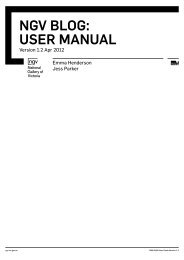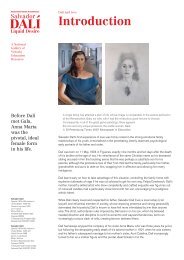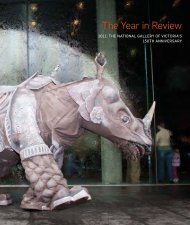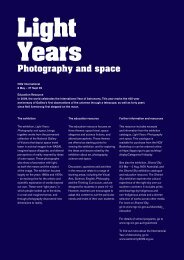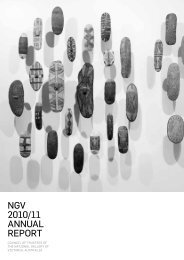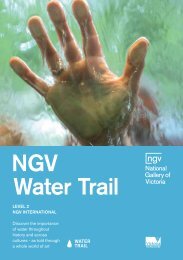Works of Art Loaned by the NGV - National Gallery of Victoria
Works of Art Loaned by the NGV - National Gallery of Victoria
Works of Art Loaned by the NGV - National Gallery of Victoria
Create successful ePaper yourself
Turn your PDF publications into a flip-book with our unique Google optimized e-Paper software.
O<strong>the</strong>r statutory matters continued<br />
• Refer <strong>the</strong> disclosure to <strong>the</strong> Ombudsman for formal<br />
determination as to whe<strong>the</strong>r it is indeed a public interest<br />
disclosure.<br />
Where <strong>the</strong> PDC concludes that <strong>the</strong> disclosure is not a public<br />
interest disclosure, he or she will:<br />
• Notify <strong>the</strong> person who made <strong>the</strong> disclosure <strong>of</strong> that conclusion;<br />
and<br />
• Advise that person that he or she may request <strong>the</strong> public<br />
body to refer <strong>the</strong> disclosure to <strong>the</strong> Ombudsman for a formal<br />
determination as to whe<strong>the</strong>r <strong>the</strong> disclosure is a public<br />
interest disclosure, and that this request must be made<br />
within 28 days <strong>of</strong> <strong>the</strong> notification.<br />
In ei<strong>the</strong>r case, <strong>the</strong> PDC will make <strong>the</strong> notification and <strong>the</strong><br />
referral within 14 days <strong>of</strong> <strong>the</strong> conclusion being reached <strong>by</strong> <strong>the</strong><br />
public body. Notification to <strong>the</strong> whistleblower is not necessary<br />
where <strong>the</strong> disclosure has been made anonymously.<br />
10 . Investigations<br />
10.1 Introduction<br />
Where <strong>the</strong> Ombudsman refers a protected disclosure to <strong>the</strong><br />
<strong>NGV</strong> for investigation, <strong>the</strong> PDC will appoint an investigator to<br />
carry out <strong>the</strong> investigation.<br />
The objectives <strong>of</strong> an investigation will be:<br />
• To collate information relating to <strong>the</strong> allegation as quickly as<br />
possible. This may involve taking steps to protect or preserve<br />
documents, materials and equipment;<br />
• To consider <strong>the</strong> information collected and to draw<br />
conclusions objectively and impartially;<br />
• To maintain procedural fairness in <strong>the</strong> treatment <strong>of</strong> witnesses<br />
and <strong>the</strong> person who is <strong>the</strong> subject <strong>of</strong> <strong>the</strong> disclosure; and<br />
• To make recommendations arising from <strong>the</strong> conclusions<br />
drawn concerning remedial or o<strong>the</strong>r appropriate action.<br />
10.2 Terms <strong>of</strong> reference<br />
Before commencing an investigation, <strong>the</strong> PDC will draw up<br />
terms <strong>of</strong> reference and obtain authorisation for those terms<br />
from <strong>the</strong> Director <strong>of</strong> <strong>the</strong> <strong>NGV</strong>. The terms <strong>of</strong> reference will set<br />
a date <strong>by</strong> which <strong>the</strong> investigation report is to be concluded,<br />
and will describe <strong>the</strong> resources available to <strong>the</strong> investigator to<br />
complete <strong>the</strong> investigation within <strong>the</strong> time set. The PDC may<br />
approve, if reasonable, an extension <strong>of</strong> time requested <strong>by</strong> <strong>the</strong><br />
investigator. The terms <strong>of</strong> reference will require <strong>the</strong> investigator<br />
to make regular reports to <strong>the</strong> PDC who, in turn, is to keep <strong>the</strong><br />
Ombudsman informed <strong>of</strong> general progress<br />
10.3 Investigation plan<br />
The investigator will prepare an investigation plan for approval<br />
<strong>by</strong> <strong>the</strong> PDC. The plan will list <strong>the</strong> issues to be substantiated<br />
and describe <strong>the</strong> avenue <strong>of</strong> inquiry. It will address <strong>the</strong> following<br />
issues:<br />
• What is being alleged?<br />
• What are <strong>the</strong> possible findings or <strong>of</strong>fences?<br />
• What are <strong>the</strong> facts in issue?<br />
• How is <strong>the</strong> inquiry to be conducted?<br />
• What resources are required?<br />
• At <strong>the</strong> commencement <strong>of</strong> <strong>the</strong> investigation, <strong>the</strong> whistleblower<br />
should be:<br />
- Notified <strong>by</strong> <strong>the</strong> investigator that he or she has been<br />
appointed to conduct <strong>the</strong> investigation;<br />
- Asked to clarify any matters; and<br />
- Provide any additional material he or she might have.<br />
The investigator will be sensitive to <strong>the</strong> whistleblower’s possible<br />
fear <strong>of</strong> reprisals and will be aware <strong>of</strong> <strong>the</strong> statutory protections<br />
provided to <strong>the</strong> whistleblower.<br />
10.4 Natural justice<br />
The principles <strong>of</strong> natural justice will be followed in any<br />
investigation <strong>of</strong> a public interest disclosure. The principles <strong>of</strong><br />
natural justice concern procedural fairness and ensure a fair<br />
decision is reached <strong>by</strong> an objective decision-maker. Maintaining<br />
procedural fairness protects <strong>the</strong> rights <strong>of</strong> individuals and<br />
enhances public confidence in <strong>the</strong> process.<br />
The <strong>NGV</strong> will have regard to <strong>the</strong> following issues in ensuring<br />
procedural fairness:<br />
• The person who is <strong>the</strong> subject <strong>of</strong> <strong>the</strong> disclosure is entitled to<br />
know <strong>the</strong> allegations made against him or her and must be<br />
given <strong>the</strong> right to respond. (This does not mean <strong>the</strong> person<br />
must be advised <strong>of</strong> <strong>the</strong> allegation as soon as <strong>the</strong> disclosure<br />
is received or <strong>the</strong> investigation has commenced);<br />
• If <strong>the</strong> investigator is contemplating making a report adverse<br />
to <strong>the</strong> interests <strong>of</strong> any person, that person should be given<br />
<strong>the</strong> opportunity to put forward fur<strong>the</strong>r material that may<br />
influence <strong>the</strong> outcome <strong>of</strong> <strong>the</strong> report and that person’s<br />
defence should be fairly set out in <strong>the</strong> report;<br />
• All relevant parties to a matter should be heard and all<br />
submissions should be considered;<br />
• A decision should not be made until all reasonable inquiries<br />
have been made;<br />
• The investigator or any decision-maker should not have a<br />
personal or direct interest in <strong>the</strong> matter being investigated;<br />
• All proceedings must be carried out fairly and without bias.<br />
Care should be taken to exclude perceived bias from <strong>the</strong><br />
process; and<br />
Annual Report 2001–2002 99




